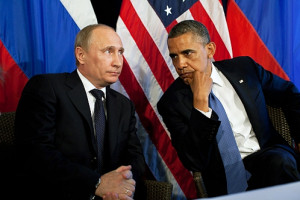Putin Understands West but West Doesn’t Understand Putin, Moscow Hybrid War Specialist Says

(Paul Goble – Window on Eurasia – Staunton, June 20, 2016)
Russia’s power does “not even come close” to that of the US, Andrey Manoylo says; but Moscow has an advantage “right now” because it understands the value of “asymmetric action” and because “the US clearly has difficulties with predicting Russia’s activities,” because of Washington’s overly simplistic models of Russian behavior.
“We already know perfectly well how Obama and John Kerry will act even before they get into a situation,” the former FSB officer who now advises the Russian defense ministry and Security Council tells Estonia’s “Diplomaatia” journal; but “nobody knows Putin will act,” despite the fact that “there is a pattern for [his] behavior” (diplomaatia.ee/en/article/fsb-information-warfare-specialist-russia-will-quickly-establish-private-military-units/).
“Unpredictable behavior is also in fact an element of predictability,” Manoylo argues, and “Putin’s behavior always remains within the confines of logic.” If one examines his actions in the past, one can see “a very simple logic,” one in which “he has applied the style of domestic policy from the 2000s where he often made seemingly very unexpected decisions to making foreign policy.”
“In today’s circumstances,” according to the widely published expert (for a hypertexted listing of his key works, see istina.msu.ru/profile/Manoylo/), “where all warfare is already hybrid, the Americans are still betting too much on brute force, on the [notion] that force can resolve any kind of issue. But it is no longer the most important thing in the world.”
“It is no longer important to strike a mighty blow from the outset; instead you need to have very fine fencing skills.” And that is what Moscow has and the West doesn’t, the Russian expert suggests.
In the first decade of this century, Manoylo worked as an FSB information warfare specialist and then began to focus on color revolutions. Since 2012, he has been employed as a political science specialist at Moscow State University and serves as an advisor to both the Russian Security Council and the Russian General Staff.
He has been involved in the development of Russian thinking about hybrid warfare as articulated over the last three years by General Valery Gerasimov, the chief of the General Staff. (For a discussion of this, see Andrew Monaghan, “The ‘War’ in Russia’s ‘Hybrid Warfare,’ at
strategicstudiesinstitute.army.mil/pubs/parameters/issues/Winter_2015-16/9_Monaghan.pdf.)
In his “Diplomaatia” interview, Manoylo expands on Gerasimov’s ideas and suggests how the general sees the military playing a role in countering color revolutions in the post-Soviet space, a role that is driven by Moscow’s assumptions about the nature of such revolutions and how they differ from other kinds of public protest.
According to Manoylo, Gerasimov believes that “when people protest spontaneously, there are never immediate massive protests as in color revolutions; instead, people initially gather in small groups, which start to create larger groups until they form demonstrations. This takes at least a month.”
But in the case of “color revolutions,” the general believes, the situation is different: “as soon as the incident occurs, it signals the protesters to take to the streets all over the city led by their activists, which means that this protesting electorate has been formed earlier and is only waiting for the signal.”
“This is preceded by recruitment and building of a city-wide hierarchy of protest cells, where each cell has its own leader, who does not know the leaders or members of other cells, only his direct superior,” he continues. “This system is very similar to how Al-Qaeda is structured or how the underground boyevik units operated in the Northern Caucasus.”
Consequently, Gerasimov thinks, “it is very difficult to fight such organizations, which act as networks, because destroying one cell does not take you to the next.” And he further understands that “there is no warfare that is not hybrid. Such wars begin long before war is officially declared and end long after a peace treaty has been signed.”
These wars “begin in the form of information warfare, diversionary acts and guerrilla warfare, and this is what the headquarters level proceeds from in planning modern warfare,” and that in turn means, Manoylo says, that “defense attaches need to be excellent specialists in information warfare, influencing the public and psychological operations.”
As a result of this understanding, the Moscow hybrid war specialist says, “the proportion of people without epaulettes is growing fast in the [Russian] military,” including a new push for private military corporations that can be deployed with deniability because it allows governments to “participate in military conflicts in their active face while not risking military involvement at the state level.”
“Not risking the lives of the soldiers of your own army,” Manoilo points out, “is a typical hybrid-warfare tactic … This guarantees that they will not clash with each other, until a certain moment of course. An ideal future war would be two PMCs doing the fighting” because they are a screen that effectively “legalizes” mercenary forces.
According to the Russian expert, “hybrid warfare without PMCs is probably not even possible anymore … direct confrontation between the main opponents is only a worst-case scenario. In hybrid warfare, world powers monitor each other’s strength, potential, and readiness to protect their interests, usually on the battlefields of the developing world.”
At present, he suggests, “Ukraine and Syria are typical” of this, “but they are not the only ones.” Asked by his Estonian interviewer whether the Baltic countries fit into this category, Manoylo responds: “the Baltic States are too small for that. I don’t want to offend anyone, but the Americans are very good at manipulating the Baltics. As the Baltic States are very small, they can be easily scared. This panic will later spread to larger European countries as well. Then they of course turn to the US for help, which enables the Americans to set the condition for the Europeans that they finally need to pay the famous two percent” on national defense.
[Article also appeared at windowoneurasia2.blogspot.com/2016/06/putin-understands-west-but-west-doesnt.html]
